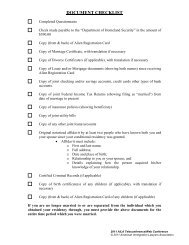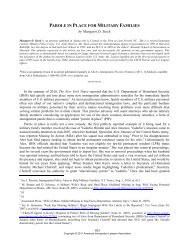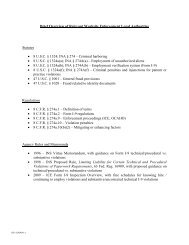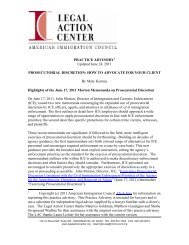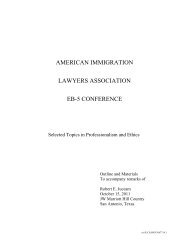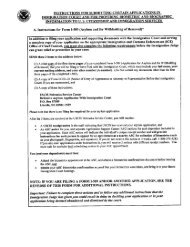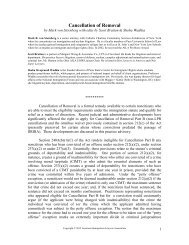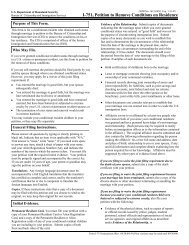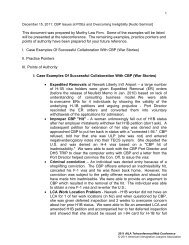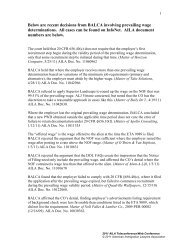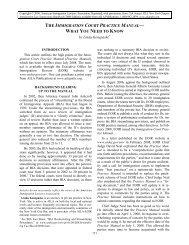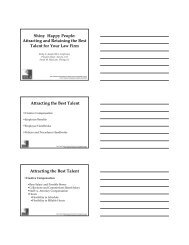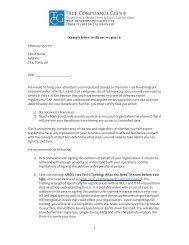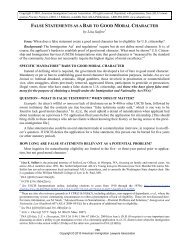Resources for 04-26-11 Seminar - AILA webCLE
Resources for 04-26-11 Seminar - AILA webCLE
Resources for 04-26-11 Seminar - AILA webCLE
You also want an ePaper? Increase the reach of your titles
YUMPU automatically turns print PDFs into web optimized ePapers that Google loves.
WAC 07277 53214Page 17On May 20, 1988, only 18 months after publication ofthe latest regulation, the INS Commissioner designateda precedent decision discussing the bright-line "proprietary knowledge"element in the definition of"specialized knowledge." Matter ofSandoz Crop Protection Corp., 19 I&N Dec. 666 (Comm. 1988). In thatdecision, the INS adopted a highly rigid approach to evaluating the "proprietary knowledge" component ofthe regulatory definition:Id. at 667-8.A petitioner's ownership of patented products and processes or copyrighted works, in and ofitself, does not establish that a particular employee has specialized knowledge. In order toqualify, the beneficiary must be a key person with materially different knowledge andexpertise which are critical <strong>for</strong> per<strong>for</strong>mance ofthe job duties; which are critical to, and relateexclusively to, the petitioner's proprietary interest; and which are protected from disclosurethrough patent, copyright, or company policy.Adding to the confusion, Richard Norton, an Associate Commissioner of the INS, issued a memorandumstating that since the new specialized knowledge regulations had been implemented, the INS had often used"a too literal definition ofthe term 'proprietary knowledge' wherein the knowledge must relate exclusively toor be unique to the employer's business operation." See Memorandum of Richard Norton, "Interpretation ofSpecialized Knowledge Under the L Classification," (October 27, 1988), reproduced in 65 InterpreterReleases <strong>11</strong>70, <strong>11</strong>94 (November 7, 1988). The memorandum explained the Associate Commissioner's viewthat possession ofproprietary knowledge is an indicator ofspecialized knowledge capacity, but that it is not anecessary condition.Issued only six months after the Matter ofSandoz Crop Protection Corp. decision, the Norton memorandumproduced considerable uncertainty among immigration attorneys. Daryl R. Buffenstein, chairman of theAmerican Immigration Lawyers Association's committee on intracompany transferees, rejected the view thatthe memo was a liberalization, concluding instead that "[a]t best this throws more verbiage into an alreadyconfusing semantic mess; at worst it could create further restrictions." 65 Interpreter Releases at <strong>11</strong>71.In 1990, Congress acted to end the agency's varying interpretations of the term "specialized knowledge."Through the Immigration Act of 1990, Congress provided a statutory definition of the term by adopting inpart and modifying the 1987 INS regulatory definition. Immigration Act of 1990, Pub.L. No. 101-649,§ 206(b)(2), 1<strong>04</strong> Stat. 4978, 5023 (1990). Congress adopted the "advanced knowledge" component of theINS definition but deleted the bright-line "proprietary knowledge" element and the requirement that theknowledge be of a type "not readily available in the United States labor market." In enacting these changes,Congress did not otherwise attempt to modify the agency's interpretation as to what constitutes specializedknowledge. In its ef<strong>for</strong>t to clarify the term specialized knowledge, Congress did, however, add an ambiguousand circular component to the definition by stating that an alien is considered to be serving in a "capacityinvolving specialized knowledge" ifthe alien has a "special knowledge" ofa petitioner's product.



